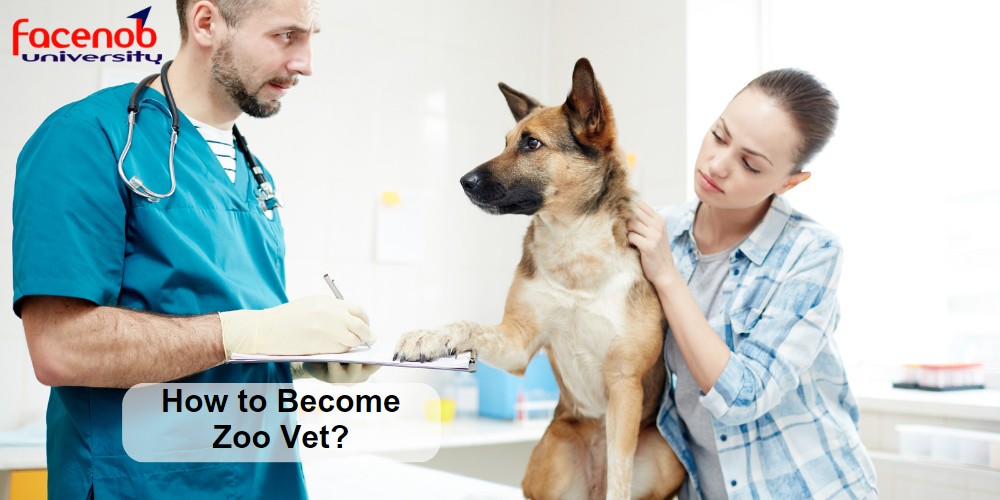How to Become a Zoo Vet?

Introduction of Zoo Vet
Zoo Vets employ their vast experience to provide appropriate medical care and treatment to various exotic creatures in captivity, including snails, catfish, lorikeets, monkeys, and elephants.
Similar Job Titles
- Zoo Veterinarian
- Exotic Animal Veterinarian

Typical Job Responsibilities
What do Zoo Vets do?
A Zoo Vet would typically need to:
- Provide emergency and routine preventative care and medical treatment to the diverse species of exotic animals held in captivity
- Conduct regular medical checkups and physical exams to assess the health and well-being of all the animals
- Take bloodwork and other samples; take ultrasounds and radiographs; diagnose and treat clinical cases
- Collaborate with zookeepers, including those who specialize in particular species
- Set bones, dress wounds, and perform surgery while adhering to mandatory safety procedures
- Manage captive breeding programs
- Maintain detailed records of all animals in the zoo; determine special diets and feeding schedules.
- Quarantine and treat disease outbreaks
- Address the comprehensive health of new animal entrants to the zoo based on diagnostic testing pre-and post-move
- Prescribe and administer medication, sedatives, and vaccinations as required.
- Monitor the work of zoo veterinary technicians; train students interested in going into zoological medicine; develop animal welfare assessment tools.
- Conduct ethical discussions and public awareness programs on animal behavior and nutrition.
- Develop and manage field projects which contribute to free-living global population conservation.
- Research and publish case reports and clinical experiences widely to increase the evidence body available, if working with exotic species
- Care for the animals that form part of the educational programs or exhibits, if employed by historical sites and museums
Standard Work Environment
Zoo Vets work with and around animals in various settings, including zoos and museums. They are usually part of a team of animal carers. Travel may be required to conduct conservation activities and collaborate with other zoos.
Work Schedule
Most Zoo Vets work full-time, more than 50 hours each week. No two days are alike. Their work schedule always changes, including nights, weekends, and holidays. You may be required to remain on call in the event of an emergency or the entrance of a new animal at the zoo. Part-time employment is a possibility.
Employers
Seeking a new job may appear difficult. Zoo Vets can improve their job hunt by soliciting referrals from their network, contacting businesses directly, using job search portals, attending job fairs, leveraging social media, and inquiring at staffing agencies. Private practice is an alternative.
Zoo Vets are generally employed by:
- Zoos
- Wildlife Preserves
- Aquariums
- Animal Sanctuaries
- Animal Refuge Centres
- Non-Profit Organisations For Wild/Exotic Animals
- Laboratories & Research Facilities
- Historical Sites
- Museums
- Educational Institutions
- Veterinary Pharmaceutical Companies
- Government Organisations
Unions / Professional Organizations
Professional organizations and associations, such as The World Association of Zoos and Animals, are essential for Zoo Vets wanting to further their professional growth or network with other industry experts or employment experts. You will be able to talk about current concerns in exotic animal health.
Participation in one or more of these organizations adds value to your resume while strengthening your credentials and qualifications.
Workplace Challenges
- Exhaustion and health issues due to standing for long periods and lifting large animals over 50 pounds
- Management of infectious diseases such as avian flu, plague, and rabies
- Inherent health risks due to exposure to diseased animals
- Probable injuries due to unpredictable interactions with animals that are aggressive, frightened, or in pain
- Exposure to inclement weather conditions from having to work most of the time outdoors
- A limited number of licensed medicines
- Management of captive breeding programs to increase sustainable populations within the zoo and release animals to the wild
Suggested Work Experience
Admission to veterinary school is quite competitive. Set your objectives on gaining the extracurricular experience that will distinguish you from other applicants by displaying your commitment to the field. Volunteer at local zoos and animal shelters to obtain skills and insight that will help you get into prominent veterinary programs.
A D.V.M./V.M.D. curriculum that is accredited will cover animal care, animal medicine ethics and practice, and clinical experience. Rotations in zoos should assist you in gaining this information. Look for summer programs that will provide you with various interesting experiences.
Immediately following graduation, most students do a one-year veterinary internship to get practical experience under the supervision of a certified veterinarian. Many zoos, aquariums, and wild animal parks have voluntary internship programs with veterinary schools that provide future veterinarians with essential work experience with exotic species.
You will assist with the feeding, cleaning, medicating, and pathological examination of animals about to be released into the wild. Volunteering in neutering and veterinary clinics will provide you with invaluable surgical expertise. You can also volunteer at wildlife rehabilitation centers or on domestic and international conservation projects.
Rotations in zoological medicine disciplines like surgery, dentistry, and anesthesia will prepare the intern for a university residency training program, private practice, or clinical scientific work. It also aids in obtaining board certification.
Individuals interested in wild and exotic animal medicine should apply for a post-doctoral zoological residency. The rigorous program takes two to three years to finish. Residency training can sometimes lead to a Master of Specialist Veterinary Medicine degree.
Six years of zoo veterinarian experience, rather than the vet internship/residency combination, can also help you qualify for board certification.
Recommended Qualifications
A D.V.M. or V.M.D. (Doctor of Veterinary Medicine) degree from a recognized veterinary medicine college is required for aspiring Zoo Vets. Programs typically last four years, including classroom instruction, laboratory experience, and clinical work. Animal science/anatomy/physiology/illnesses, biology, chemistry, and zoology are frequent courses.
Students with a bachelor’s degree in biology, animal science, chemistry, or zoology with a good GPA are encouraged to apply. These curricula should ideally include organic and inorganic chemistry, biochemistry, anatomy, physiology, molecular and cell biology, physics, and mathematics.
Certifications, Licenses, and Registration
Zoo Vets must be board certified in zoological medicine and acquire licensure to practice.
Certification normally requires a mix of schooling, zoo vet experience/internship/residency, and extensive testing, though criteria vary by location. Furthermore, certain certifying bodies may demand applicants to have published three to five zoological articles in peer-reviewed publications, complete a credentials package, and obtain letters of recommendation.
An application, processing costs, one or more examinations, an authorized D.V.M./V.M.D. degree, and experience are typically required for licensure. Consult with your local or national veterinary organization for specific regulations.
Projected Career Map
Proficiency, experience, and acquiring professional qualifications drive Zoo Vets’ career advancement, which can lead to the position of Chief Zoo Vet with the necessary board certification. You may also be considered for additional senior positions and training positions.
Because not everyone on the team can become Chief, you can improve your career by leading certain departments such as feeding; you can obtain competence in caring for specific animal species or in specific aspects of zoological medicine such as anesthesia.
On most linear career paths, reaching the higher end of the income range is a critical step. Starting up a private practice can be a rewarding experience. You can also look for chances in conservation programs and wild species studies worldwide.
You can move to management and supervisory positions if you work for a veterinary pharmaceutical company or an educational institution.
Job Prospects
The finest career possibilities go to candidates with the necessary board qualification, professional experience, and licenses.
Beneficial Professional Development
CPD will assist an active Zoo Vet develop personal skills and proficiency through work-based learning, a professional activity, formal education, or self-directed learning.
Board certification might help you develop in your job and earn higher pay. For increased pay, look for positions in zoos located in metropolitan regions.
Zoo Vets might expect help and additional training from their academic institution or Vitae, a non-profit global leader with over 50 years of experience improving researchers’ skills.
Vitae provides training, resources, events, consultancy, and membership in collaboration with governments, research funders, professional groups, trusts and foundations, universities, and research institutes.
Conclusion of Zoo Vet
A Zoo Vet’s professional function is best described as unpredictable yet extremely satisfying work that requires entire attention to promoting the health and well-being of caged and free-roaming wild animals.
Advice from the Wise
Maintain good grades in school. Work with domestic and wild animals alongside qualified veterinarians to obtain hands-on experience.
Explore Also: How to Become a Rancher?
